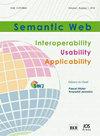QALD-10 – The 10th challenge on question answering over linked data
IF 2.9
3区 计算机科学
Q2 COMPUTER SCIENCE, ARTIFICIAL INTELLIGENCE
引用次数: 0
Abstract
Knowledge Graph Question Answering (KGQA) has gained attention from both industry and academia over the past decade. Researchers proposed a substantial amount of benchmarking datasets with different properties, pushing the development in this field forward. Many of these benchmarks depend on Freebase, DBpedia, or Wikidata. However, KGQA benchmarks that depend on Freebase and DBpedia are gradually less studied and used, because Freebase is defunct and DBpedia lacks the structural validity of Wikidata. Therefore, research is gravitating toward Wikidata-based benchmarks. That is, new KGQA benchmarks are created on the basis of Wikidata and existing ones are migrated. We present a new, multilingual, complex KGQA benchmarking dataset as the 10th part of the Question Answering over Linked Data (QALD) benchmark series. This corpus formerly depended on DBpedia. Since QALD serves as a base for many machine-generated benchmarks, we increased the size and adjusted the benchmark to Wikidata and its ranking mechanism of properties. These measures foster novel KGQA developments by more demanding benchmarks. Creating a benchmark from scratch or migrating it from DBpedia to Wikidata is non-trivial due to the complexity of the Wikidata knowledge graph, mapping issues between different languages, and the ranking mechanism of properties using qualifiers. We present our creation strategy and the challenges we faced that will assist other researchers in their future work. Our case study, in the form of a conference challenge, is accompanied by an in-depth analysis of the created benchmark.QALD-10 - 第 10 届关联数据问题解答挑战赛
过去十年来,知识图谱问题解答(KGQA)受到了业界和学术界的关注。研究人员提出了大量具有不同属性的基准数据集,推动了这一领域的发展。其中许多基准都依赖于 Freebase、DBpedia 或 Wikidata。然而,依赖 Freebase 和 DBpedia 的 KGQA 基准的研究和使用逐渐减少,因为 Freebase 已经失效,而 DBpedia 缺乏 Wikidata 的结构有效性。因此,研究工作开始转向基于维基数据的基准。也就是说,在维基数据的基础上创建新的 KGQA 基准,并迁移现有基准。作为关联数据问答(QALD)基准系列的第10部分,我们提出了一个新的、多语种、复杂的KGQA基准数据集。该语料库以前依赖于 DBpedia。由于QALD是许多机器生成基准的基础,我们增加了其规模,并根据维基数据及其属性排序机制调整了基准。这些措施通过要求更高的基准促进了 KGQA 的新发展。由于维基数据知识图谱的复杂性、不同语言之间的映射问题以及使用限定词的属性排序机制,从零开始创建基准或将其从DBpedia迁移到维基数据并非易事。我们将介绍我们的创建策略和面临的挑战,这将有助于其他研究人员今后的工作。我们以会议挑战的形式进行了案例研究,并对创建的基准进行了深入分析。
本文章由计算机程序翻译,如有差异,请以英文原文为准。
求助全文
约1分钟内获得全文
求助全文
来源期刊

Semantic Web
COMPUTER SCIENCE, ARTIFICIAL INTELLIGENCEC-COMPUTER SCIENCE, INFORMATION SYSTEMS
CiteScore
8.30
自引率
6.70%
发文量
68
期刊介绍:
The journal Semantic Web – Interoperability, Usability, Applicability brings together researchers from various fields which share the vision and need for more effective and meaningful ways to share information across agents and services on the future internet and elsewhere. As such, Semantic Web technologies shall support the seamless integration of data, on-the-fly composition and interoperation of Web services, as well as more intuitive search engines. The semantics – or meaning – of information, however, cannot be defined without a context, which makes personalization, trust, and provenance core topics for Semantic Web research. New retrieval paradigms, user interfaces, and visualization techniques have to unleash the power of the Semantic Web and at the same time hide its complexity from the user. Based on this vision, the journal welcomes contributions ranging from theoretical and foundational research over methods and tools to descriptions of concrete ontologies and applications in all areas. We especially welcome papers which add a social, spatial, and temporal dimension to Semantic Web research, as well as application-oriented papers making use of formal semantics.
 求助内容:
求助内容: 应助结果提醒方式:
应助结果提醒方式:


